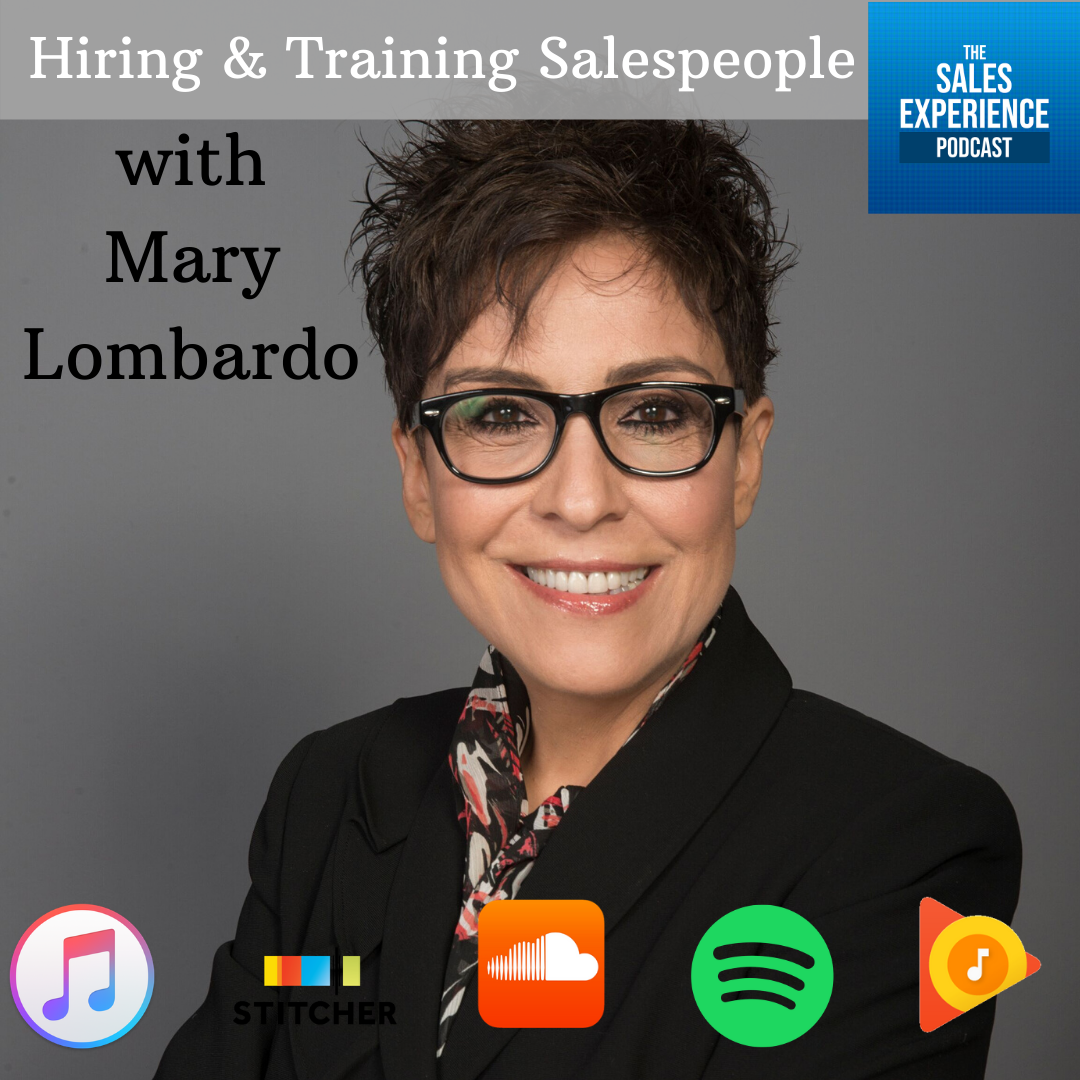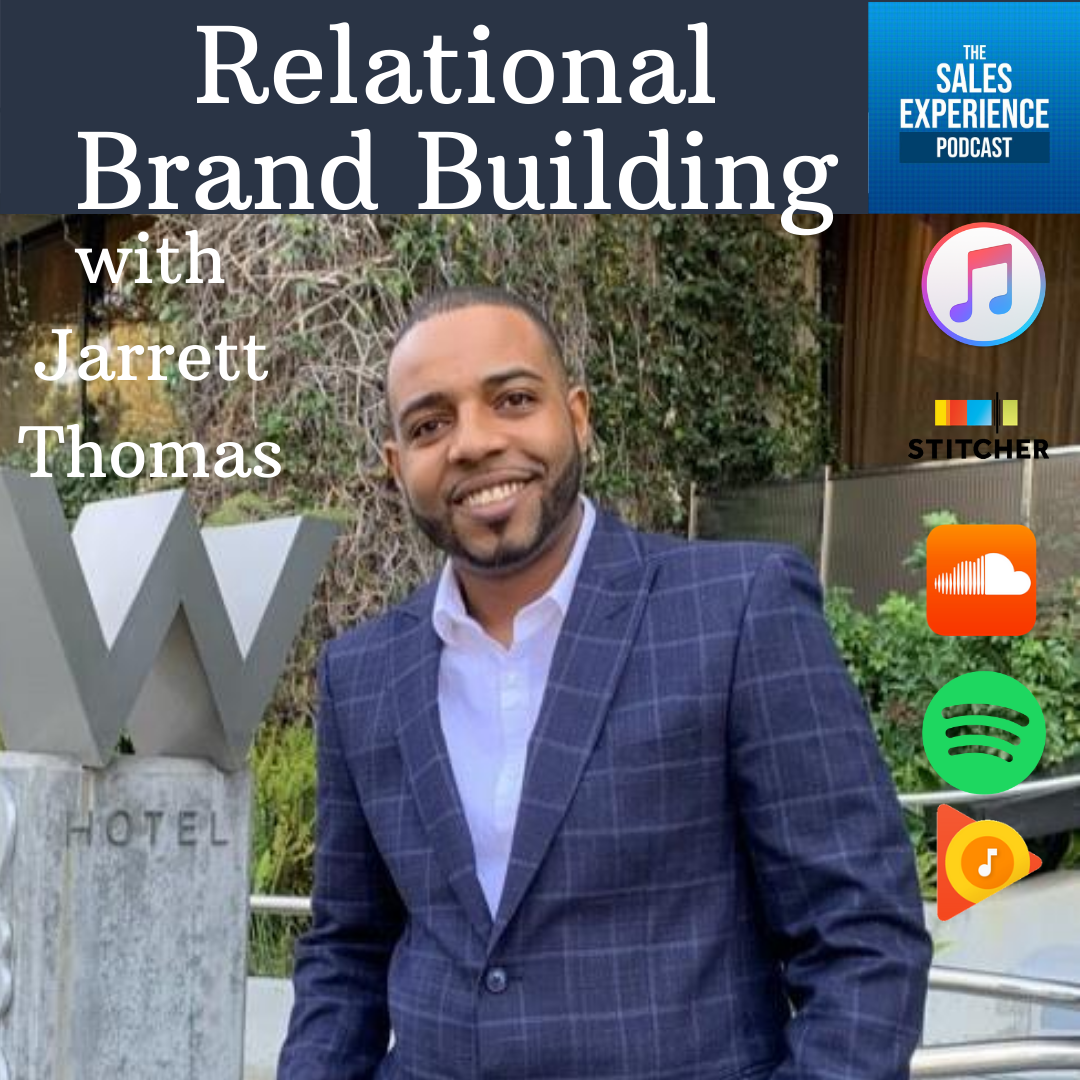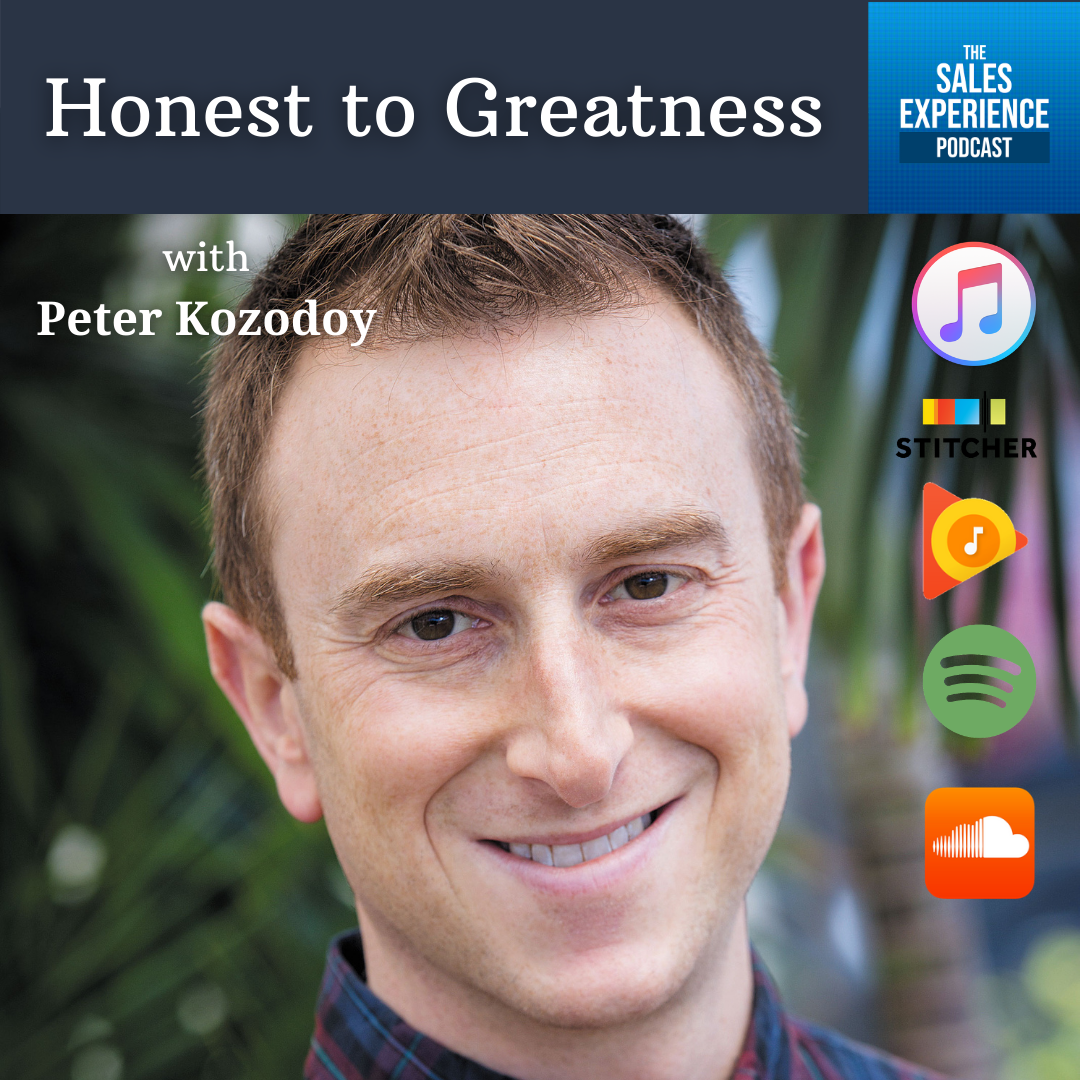Episode Transcript
Jason: Welcome back to the sales experience podcast. This is part four, the final part of my conversation with Yerun Korthout of SalesFlare. So make sure that you find out about him. Go online, go to salesflare. com. You can also find him on LinkedIn, which he's going to mention at the end of this episode. He's doing lots of cool stuff.
I appreciate his. Attitude and approach when it comes to sales, he continues to drop more nuggets here in this fourth part. So make sure if you haven't checked out the first three parts and here you go, part four, enjoy.
Jeroen: Might look slightly different than it is in your sales pipeline. And even knowing that subtlety for every single customer.
Is I think what really distinguishes the sort of one off accidentally good salespeople from the systematically good salespeople.
Jason: I love it. I love the fact that you're talking about having a system. And essentially what you're saying at the end there is somebody who's a professional, right?
They're not just playing salesperson. They're wanting to be a professional salesperson, but using a system. And a process in a sales system in order to focus on the relationships and make it about that person in the moment. Yeah, I've always done that where I've always taken lots of notes and would call somebody back and be like, Hey, I know last time we talked to you were at the soccer game with your kids.
How did that go? And it blows people away because they're not expecting that from a salesperson, right? They're expecting the hard sale and the push and the tricks and the closing lines. And they aren't expecting somebody who listened and care and to do that at scale instead of just five conversations a week, you've got to have a system because at some point you can't remember the details of every single prospective customer you're talking to.
So I love it.
Jeroen: Yeah. And that's a, that's a huge opportunity because like you said, people are not expecting it. Expectations are so low that it's very easy to beat them. And if you Beat them by a large margin, then you can really blow people away. And that's where you build trust and where you build great relationships that hopefully even outlast the sales that you did or the customer relationship.
Jason: And I think that's the key, right? No matter what the sales cycle, let's say for you, for example, your salesperson could have one of those one call closes. They never talked to that customer ever again, because now they're in. Client success, customer success, a long term management mode and the best salespeople still view it as creating a long term relationship, whether they ever talked to that person again or not, just building it that way and the other part that you mentioned.
This is what I tell people all the time. When in doubt, just do the opposite of what other salespeople do of what you think a salesperson should do or what you don't like in salespeople. Just do the opposite. And literally just do the opposite if all else fails, and you'll do okay.
Jeroen: Do what a human being would do, or do what you would do to a friend or whatever.
Jason: Exactly, and I've heard people say it's sell to people like you would want somebody to sell to your grandma. Yeah. It's like, how would you want them to treat your family member? Then do that, right? Hopefully you like your grandparents and you don't want to take advantage of them. But for most people, it's good advice.
Jeroen: Yeah. Or if you don't like your grandparents or something, do as if you're selling to your best friends. Yeah.
Jason: Maybe your best friend would be better. Maybe your parents, maybe somebody you like. Yeah. And I feel like we touched about this a little bit, but what's the best trait or mindset type mode for top salespeople that you've seen?
Jeroen: Traits or mindsets?
Jason: And it may be the relationship that you were talking about, like focusing on that. And what you said about the top salespeople, it's really that trait as well, where they're also focusing on the other person.
Jeroen: Yeah, no, that's probably what I'd answer, yeah. Focus on the other person and trying to do that in the best possible way, because they are sort of People who do their job, and as long as there's some sort of level of success, they're happy I've done my job, I go home now.
But really trying to excel at it as a salesperson. Let's go back and imagine all the things we talked about, like you're applying that empathy, you really try to understand what people want, and what their situation is, what their next steps are. You're doing that at scale, and you have a system that makes that you can do that for a lot of people at once.
And then you really try to not just make it work, but really do it in a very good way. Every day, you do your best to make this work. I read a book and it was called Mindset, even, I think. And it's by, from memory, I think Carol S. Dweck. And she calls it a growth mindset. So it's the belief that your abilities are not set, but they can be developed and only by doing your best and trying to advance that you really succeed.
Jason: Makes sense. And that's a mindset trait of success, an indicator of success for me, for people, especially in sales. Is when they have that growth mindset versus the I've been doing this for a long time. I know what I'm doing. I don't need any help. I don't need your script. I don't need your process. Like just show me the phone and I know how to close deals.
That kind of person can do well for a bit, but not long term, right? Because they want to do it their way and conform the world to their process instead of being open to what it might take. If you look at the fact that it's 2020 and that. You can no longer assume that customers need you for information, right?
They've got all the information they need. They don't need you anymore for information. They need you for wisdom, but they don't need you for information. And some salespeople literally can't get out of that mode where they still feel like they have to monologue and basically read from the brochure and list all the features and talk about the situation or the issue.
It's like your customer knows. You got to assume your customer knows all that, right? You don't educate.
Jeroen: It's maybe they're having the Humility to understand that this is your place and that you're merely there to guide people Where they don't know the way in the sales process or the buying process or whatever And they might have more information already than you have because they're so into finding, for instance, the right CRM that I've researched literally everything.
Knowing that, that really helps to attack this in the right way.
Jason: Yeah. And spend the time wisely when talking to a prospect instead of boring them with details. Sometimes it's good to ask, see if they need to know more details and information about CRMs in general or the state of things. But a lot of times they don't.
Let's shift a little bit because I'm super curious. What was the most non sales job that you've had in your life?
Jeroen: My jobs were mainly marketing jobs. But the very first sort of professional thing I did was building websites. That was when I was 15, 16. I was building websites for myself and a few other people.
Probably the most non sales thing I did. And then I studied engineering. Which was also very non sales and I applied for a few jobs, but I didn't really like the idea of not working with customers, like being behind a computer and building something is cool. I like building stuff, but not having that link with the customer where someone else takes care of that.
I didn't really like that idea. So I ended up doing business school and then getting into marketing and
Jason: love it. And what was your first sales job like that? You would classify as a sales job.
Jeroen: That was the job I referred to earlier where I use Salesforce in that marketing consultancy, I started off in that company as a project manager.
Not taking care of the responsibility of the project towards the customer at first, but after a few months I got promoted to account manager and I've been doing that for years, really going end to end from discovering what the issue was that the pharma company was facing. All the way to conceiving the project, selling the project, managing the project to make sure that they were happy.
Jason: That's awesome. And when you were growing up, what is it that you wanted to do? What did you think that you wanted to do when you grew up?
Jeroen: The earliest thing I can remember was being a conductor in the train that goes between Belgium and the UK. Under the water, that seemed like an awesome job at that moment.
I don't see any more why, but then at some point that shifted into some kind of engineering job, then I started building websites and I saw myself having a website agency and becoming a software engineer, but then I went to the open day of the university and all these software engineers seemed so nerdy.
The things they were displaying seemed like out of the world. I couldn't see like the practical value of what they were showing me. Really? So I ended up in the end studying biomedical engineering, electro technical and biomedical engineering. So a totally different thing.
Jason: Interesting. I love it. At this point in your life, obviously having gone through a lot of journeys and discovery in your own life, what's your definition of success?
Jeroen: Helping other people succeed. Every time somebody is really saying we use your software, we love it. That's nice. But then if they say we're saving like a million a year by using it because we can properly follow up, we drop way less deals and customers are happier. That's when you really feel that you made a difference like beyond the software.
I'm also thinking like long term, even if it's not sales, I'd really like to focus on making small businesses succeeds more often. There's a lot of small businesses that are really doing nice things. Innovative things for the world more than many big businesses are doing, but they can only succeed with the right practices and the right sort of sales and helping with that.
I don't know exactly how yet, but. It seems like a good thing to focus on.
Jason: And obviously anyone that knows me knows that I love and appreciate what you've said, because it's about helping other people and improving their situation, not just helping them short term, but long term big impactful ways. And it's very interesting because I have the same thought as you with small businesses is working with them, selling to them.
And now consulting, like even beyond the consulting that I do on the sales side, I just really have this draw to help small businesses win in any way I can. Even if it's not sales, like I talked to a lot of companies where it's okay, you should do this. You should talk to this person. Just want to help them win at their game because I know it's hard and I know that they're usually missing some pieces where if they've got that, then it would change their whole game.
So I'm excited to see what you discover when you get into that more.
Jeroen: Yeah, I know that when I'm at a conference, for instance, and they have this expert hours or whatever they call it, and I can help companies with just rethinking very simple things in their sales process or so. That gives me a lot of satisfaction.
It's really nice to be able to see them, that they get to insights and think, Oh, I can also do it like that. It's great. But then on the other hand, I don't know how I would do it. I don't see myself becoming a consultant and charging for it and all this kind of thing. So I don't know.
Jason: So just maybe a business advisor, or maybe you'll start your own conference.
Yeah maybe who knows? And then yeah, when they come back, people might be excited to get back to conferences. So one last question, I thought of this one yesterday. So you're totally not even prepared for this one. Which one between these two, the journey or the destination?
Jeroen: The journey, definitely.
Yeah. The destination is even if you have this huge destination, at some moment you reach it, and then it's just, it's gone again. There's a quote, I actually recited it to a friend on Friday, from the end of Lord of War, where Nicolas Cage says, there's only two tragedies in life, one is not getting what you want, and the other is getting it.
And that's completely about the journey.
Jason: Yeah, I love it. So the main place for people to find you is the website salesflare. com. Anywhere else where you're active?
Jeroen: Yeah, but if it's for salesflare, you can check out salesflare. com. You can try the software there, button at the top right. Trials 30 days, depending on how far you set it up.
We give you more trial days. And to get in touch with me LinkedIn is the best place. Please do include a message, otherwise I have no way of distinguishing you from the inauthentic spammers out there.
Jason: And if you are going to spam him with messages, please don't message, tell him that you heard it from the show.
I don't want to be blamed for that, for the instant sales pitches on LinkedIn.
Jeroen: Yeah, please don't. Yeah. It's a good idea. I will ignore you anyway in that case.
Jason: There we go. I appreciate your time here and going through the questions and everything that you're doing with sales teams. And thanks for your time today.
Jeroen: Yeah. Thank you. It was fun.
Jason: That's it for another episode of the Sales Experience Podcast. Thank you so much for listening. If you find yourself on iTunes, can you leave the show a rating and a review? It helps other salespeople and sales leaders find the show, and please subscribe to the show and share episodes you find valuable with anyone you know in sales.
Help me on my mission of changing the way sales is done, and if you're ready to work together, go to jason cutter.com. Again, that's jason cutter.com. To find out how I can help you or your company create scalable sales success. I will see you on the next sales experience podcast episode, and keep in mind that everything in life is sales and people will remember the experience you gave them.
![[E294] Solving The CRM Problem, with Jeroen Corthout (Part 4)](https://episodes.castos.com/salesexperiencepodcast/images/Season-3-TSEP-Covers-6.png)


